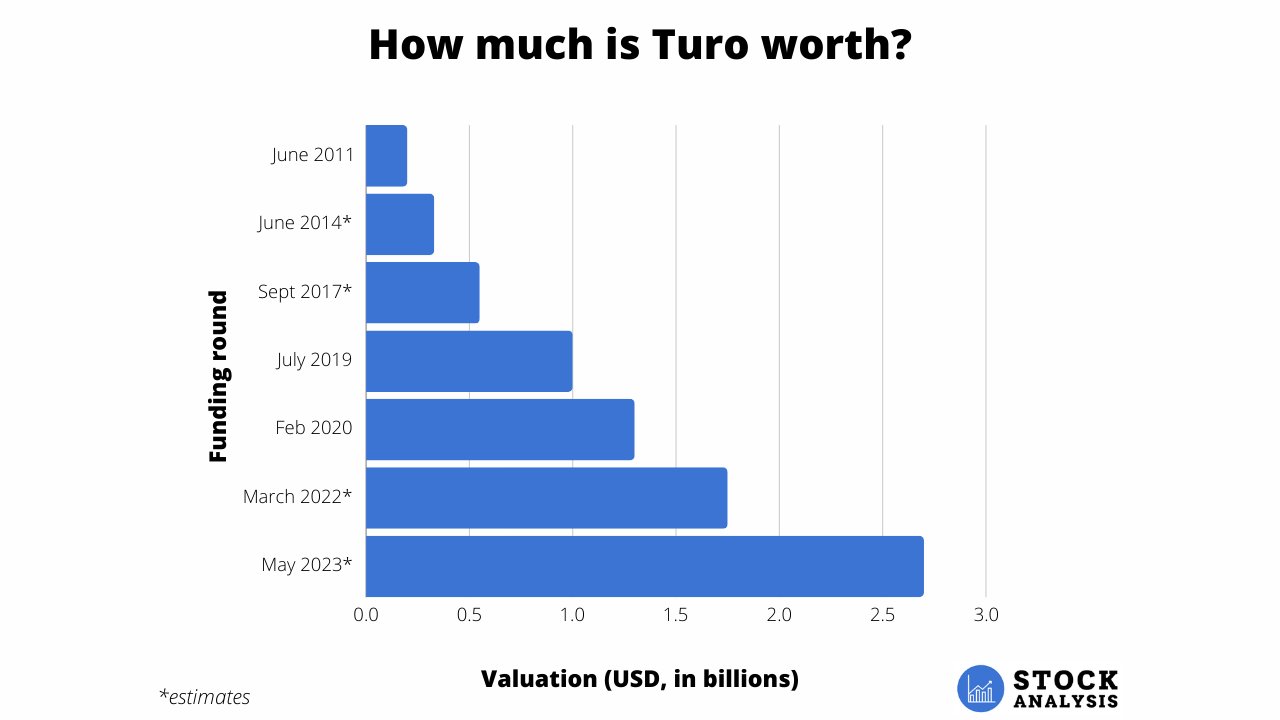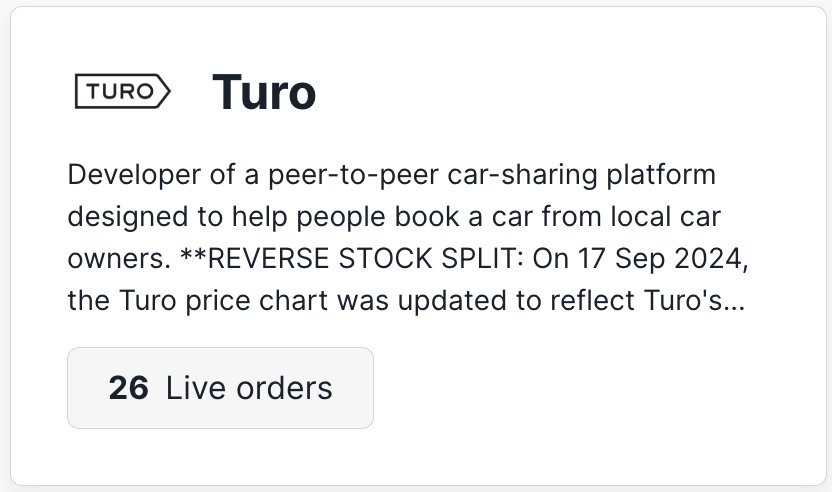How to Buy Turo Stock Before Its IPO

Turo is a car-sharing marketplace where users can rent cars from owners at daily rates. It's like Airbnb, but for cars.
For renters, it's cheaper, easier, and more fun than using a traditional car rental agency. For car owners, it's a great way to make some extra income or launch an entire car-renting business.
Better yet? For Turo, it's a capital-light and cash-rich business model. And it's working really well.
Turo has over 3 million users and more than 360,000 active vehicles listed on its platform. It operates in 14,000+ cities in the US, UK, France, Canada, and Australia. But what about financial results?
Turo generated $879.6 million in revenue in 2023, up nearly 88% since 2021. The company has been profitable for nearly three full fiscal years.
Still, and despite multiple S-1 filings (the paperwork a company completes just before going public), Turo remains a private company.
Turo was preparing to IPO in 2025 but withdrew those plans on February 13, 2025.
But there is a way to invest in it before it goes public. Here's how.
Can you buy Turo stock?
Turo is still a private company, which means it is not publicly traded and you can't buy it in your brokerage account (yet).
The company has been planning to go public via an IPO since 2021 and has even reserved the stock symbol TURO. However, it has been waiting until the IPO market warms up before making its public debut.
Given its nearly $1 billion in revenue and the fact that it's running profitably, Turo is not in any hurry to go public. Management will wait until it's confident the market is excited about the offering and willing to pay a premium price.
While the IPO market has been a bit friendlier this year, Turo has not set a date for its IPO. There's no telling how long we'll have to wait before it goes public.
But there is a way for accredited investors to buy its stock today.
How to buy Turo stock
If you qualify as an accredited investor (individuals with annual income of more than $200,000 or $300,000 for married couples, or a net worth exceeding $1,000,000 excluding your primary residence), you can invest directly in Turo on Hiive (more info below).
If you're a retail investor, there are a few other ways to gain exposure to Turo. Those are covered in the second section below.
How to buy Turo stock as an accredited investor
Hiive is a secondary marketplace which allows accredited investors to buy shares of high-growth, VC-backed startups and private companies, including Turo:
As of February 2025, there are 26 unique listings (with varying prices and volume offered) of Turo stock available on Hiive. The sellers may be employees, venture capitalists, or angel investors.
On Hiive, buyers can either accept the asking prices and volume offered or place bids and negotiate directly with the sellers.
Register for Hiive and start investing in private companies today:
How to invest in Turo as a retail investor
While buying Turo via Hiive is only possible for accredited investors, here are a few investment ideas to get exposure to Turo or the car-sharing industry in general.
1. Invest in Turo's investors & partners
Most of Turo's 32 investors are private equity and venture capital firms, but there have been a few investments from publicly-traded companies.
Google Ventures (GOOG, GOOGL), Mercedes Benz (MBGYY), American Express Ventures (AXP), and IAC (IAC) have all invested in Turo.
Though the exact size of each investment is unknown, each of these companies' stakes are likely very small relative to the size of the primary business, and would be an extremely indirect means of gaining exposure to Turo.
For example, even if Google invested $100 million, that investment would represent just 0.004% of Google's $2.2 trillion business. If you're buying Google because of its stake in Turo, you better make sure you like the other 99.996% of its business, too.
Turo has also shown an interest in partnerships in the past. In 2012, it partnered with General Motors (GM) in hopes of creating keyless entry, but this project was shut down in 2013. Additionally, you can earn miles on Delta Airlines (DAL) when renting cars on Turo.
While neither of these partnerships make for particularly compelling investment ideas, you should keep an eye out for future partnerships that could have an outsized impact on the partnering party.
2. Publicly-traded competitors
- Avis Budget Group (CAR) - Avis provides car and truck rental services in the U.S. and internationally. While Turo is aiming to disrupt this industry, Avis is still a massive company with deep customer loyalties. Plus, Avis owns car-sharing app ZipCar which much more closely resembles Turo, except the company owns all of the vehicles.
- Getaround (GETR) - Getaround is a direct competitor of Turo's which went public in late 2022. However, the stock was delisted after falling 98%, and now trades over-the-counter as a penny stock. Although this is probably the most direct way for retail investors to gain exposure to the car-sharing industry, I wouldn't recommend this stock as the company appears troubled.
- Uber Technologies (UBER) - Uber is a ride-hailing company with a $156 billion market capitalization. In June 2023, Uber launched Uber Carshare, a direct competitor to Turo. However, despite having the existing user base, the infrastructure, and plenty of capital to seriously challenge Turo, Uber Carshare was closed in September 2024.
Who owns Turo company stock?
So far, Turo has raised $502.6 million from 32 investors over 14 funding rounds dating back to 2011.
The vast majority of these investors are private equity and venture capital firms, along with a few venture arms of public companies (like Google, Mercedes, American Express, and IAC).
Turo was originally founded as RelayRides and was launched in June 2010 by Shelby Clark. He started the company with his Harvard Business School classmates Nabeel Al-Kady and Tara Reeves.
It was subsequently taken over by Andre Haddad and moved from Boston to San Francisco in late 2010. Andre Haddad still acts as the company CEO.
There is not much information available about the current ownership structure of the company.
Turo Financials
The company has been providing quarterly updates on its performance since filing its S-1 in 2022.
From these documents, we know that Turo:
- Generated revenue of $879.6 million in 2023, up 18% YoY
- Generated revenue of $746.6 million in 2022, up 59% YoY
- Generated revenue of $469 million in 2021
Additionally, after net losses of about $90 million in both 2019 and 2020 and a net loss of $40.4 million in 2021, Turo posted net income of $154.7 million in 2022.
Its net income shrank to just $14.7 million in 2023 due to a strategic increase in marketing spend.
How to buy the Turo IPO
Turo first hinted at an IPO in 2021 when it made a private filing followed by a public S-1 in early 2022. However, Turo has since ammended its S-1 nine times, delaying its plans to go public until the IPO climate improves.
Turo's profitability allows it to continue waiting until the market becomes more welcoming to IPOs. When its shares do go public, I expect it will make a big splash.
If you want to invest in it when it finally does go public, then you will need a brokerage account.
If you don't have a brokerage account, you can look into Public.com. You can invest in stocks, ETFs, Treasuries, corporate bonds, cryptocurrencies, and more all from the same login.
Turo valuation chart
Turo's most recent fundraising round valued the company at $1.25 billion, but that was several years ago.
More recently, in May 2023, trading on the secondary market implied a valuation of $2.7 billion.
Here's a look at how Turo's valuation has changed over time:

Any views expressed here do not necessarily reflect the views of Hiive Markets Limited (“Hiive”) or any of its affiliates. Stock Analysis is not a broker-dealer or investment adviser. This communication is for informational purposes only and is not a recommendation, solicitation, or research report relating to any investment strategy, security, or digital asset. All investments involve risk, including the potential loss of principal, and past performance does not guarantee future results. Additionally, there is no guarantee that any statements or opinions provided herein will prove to be correct. Stock Analysis may be compensated for user activity resulting from readers clicking on Hiive affiliate links. Hiive is a registered broker-dealer and a member of FINRA / SIPC. Find Hiive on BrokerCheck.


.png)


.png)

